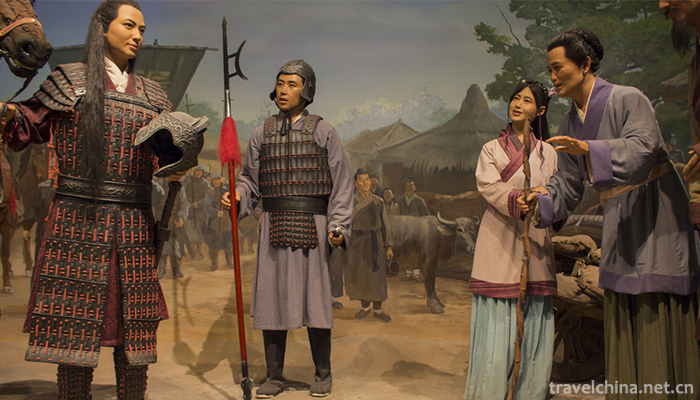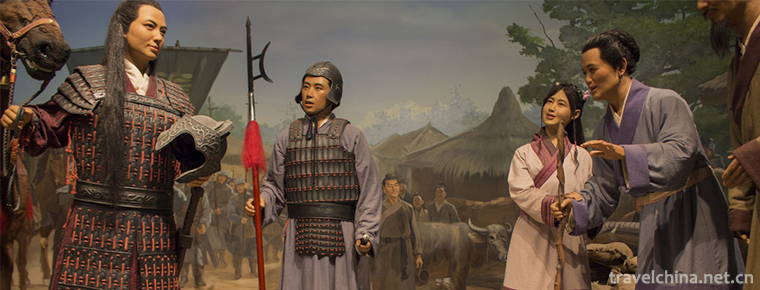Mulan Legend Hua Mulan Legend
Mulan Legend Hua Mulan Legend
Mulan legend, Yucheng City, Shangqiu City, Henan Province, and Huangpi District, Wuhan, Hubei Province, is one of the national intangible cultural heritage.
Mulan legend is one of the Chinese folklores. Mulan legend began in Sui and Tang Dynasty. It is characterized by the spread of Chinese folk oral language in the early period, and then by the appearance of complete and concise written forms. There are nine plots. The story has been handed down from the Sui Dynasty to the present. It contains more than a thousand years of historical information in various historical stages, involving ethics, folklore, religion, literature, art and other aspects. It is of great historical research value.
On June 7, 2008, Mulan Legend was approved by the State Council to be included in the second batch of national intangible cultural heritage list, numbered I-50.
Background of declaration
In March 2007, the Mulan Legend declared by Yucheng County of Shangqiu City was listed as the first batch of Henan Province-level intangible cultural heritage.
On May 22, 2007, the Chinese Association of Folk Literary and Artists made a decision to officially name Yucheng County as the "Town of Mulan in China", and agreed to establish the "Mulan Culture Research Center of China" in Yucheng County of Shangqiu City.
On June 6, 2007, Mulan Legend declared by Huangpi County of Wuhan City was listed as the first batch of intangible cultural heritage in Hubei Province.
In November 2007, Huangpi County began to declare Mulan Legend to the National Committee of Experts on the Protection of Intangible Cultural Heritage.
On June 7, 2008, the Mulan Legend jointly declared by Huangpi District of Wuhan, Hebei Province and Yucheng County of Shangqiu City, Henan Province, was approved by the State Council and listed in the second batch of national intangible cultural heritage list and publicized.
On June 14, 2008, Mulan Legend declared by Huangpi County, Hubei Province, was included in the second batch of national intangible cultural heritage list.
historical origin
The story of Mulan Legend originated in Sui and Tang Dynasty. The Mulan Ci in Guyuefu was written by Li Pharmacist, the national teacher in the early Tang Dynasty. This period is the primary period, and it is characterized by the spread of early folk oral language. Since then, it has been characterized by complete and concise writing. Finally, the main features are the comprehensive interpretation of Mulan's ideological connotation and the diversification of its manifestations. The Song, Yuan, Ming and Qing Dynasties are the period of evolution, with the further emphasis and enrichment of Mulan's ideological and ethical connotation and the more literary and artistic transformation of Mulan's image as the main features. In modern times, it is a period of development, characterized by highlighting the noble spirit of Mulan's thoughts and feelings. The contemporary era is a period of change, with Mulan legend as a traditional human resource as the main feature.
Story content
Dispute over surnames
The story of Hua Mulan has a long history and has been well-known for more than a thousand years. However, there are still many legends about her family name, Liju and birth age.
About her surname, some people say it is Wei (Daming Unified Records, Daqing Unified Records, Henan Tongzhi, Guide Fu Zhi, Shangqiu County Zhi, Yucheng County Zhi, Bozhou Zhi, Wanxian Zhi, etc.); others say it is Mulan; others say it is Zhu (Qing Dynasty's Biography of Loyalty, Filial Piety and Wonderful Woman, the True Book of Salvation of General Mulan Zhongli).
This surname of Mulan is commonly known in the folk. There are three possibilities: one is that Mulan is a kind of flower name, which is inverted from Mulan; the other is that Mulan is called "Hua Gu", which is the nickname of Mulan; and the biggest one is the miscellaneous drama "Four Sounds of Apes" written by Xu Wei, a dramatist of the Ming Dynasty.
The title of a play in "Four Voices of Apes" is "Female Magnolia Entering the Army on behalf of Her Father". The plot of this play came from the Romance of Mulan Ci in Yuefu Poetry Collection of the Northern Song Dynasty, but Mulan has no surname in Mulan Ci. For the need of theatrical performance, Xu Wei gave Mulan a "flower" surname, highlighting the female beauty of Mulan. He also named Mulan's father "flower arc". In fact, the so-called "flower arc" is the homonym of "flower vague", implying the meaning of vague names, which is a common method used by writers.
Later, Mei Lanfang, a master of Peking Opera, adapted Mulan to join the army. He was more cautious at that time, and did not add his surname to Mulan when it was difficult to access information. Until after liberation, Chang Xiangyu, an artist of Henan Opera, adapted the Beijing Opera "Mulan Entering the Army" into Henan Opera, named "Hua Mulan", and toured the country. She also made movies, which had a wide influence. So far, the term "Hua Mulan" has been well known among the people, and it has spread widely, which makes people really mistake Mulan as "Hua".
Household Registration in the 1990s
As for the age of Hua Mulan's birth, Cheng Damao in the Song Dynasty said she was from the early Tang Dynasty in Yan Fanlu. Yao Ying in the Qing Dynasty said that she was from Emperor Xiaowen in the Northern Wei Dynasty to Emperor Xuanwu in Yingguo Town, Gushu County (now Shangqiu Yucheng County); Song Xiangfeng's Guoting Lu in the Qing Dynasty and Guide Fu Zhi and Bozhou Zhi recorded that she was from Emperor Gongdi in the Sui Dynasty. Huangpi County Chronicle records that she was born in Zhenguan of Tang Dynasty.
"Henan Tongzhi", "Guide Fu Zhi" and "Bozhou Zhi" all said that she was from Yingguo Town, Gushu County, Songzhou in the Sui Dynasty, and Lu Kun in the Ming Dynasty recorded in "Boudoir Fantu Shuo" "Mulan, Shangqiu people." The Records of the Unification of the Qing Dynasty said that she was from Dongwei Village in Xuxian County. The Qing Dynasty "Bozhou Chronicle" Volume 1 Geographic Records: "The Yuan Dynasty has a statue of a filial piety general temple, the general's name Mulan, Bozhi people. Suiyang is eighty miles southeast of the border. It is called Yingguo, the ancient Bofang area and the ruins of filial piety. Guo Jinyingguo is Yingguoji, seventy miles southeast of Shangqiu. Hou You thought that the ancient Bo area, the ruins of filial piety, filial piety to the people. And the former residence here, we can see that Yingguo's land belongs to Shangqiu, which used to belong to banishment.
The Qing Dynasty novel The Story of Loyalty, Filial Piety, bravery and Woman claims that Mulan was a native of Xiling County, Huangzhou Prefecture in the Tang Dynasty.
Inheritance value
The main value of Mulan Legend lies in: Firstly, the story has been handed down from Sui Dynasty to the present. It contains information of various historical stages in China for more than a thousand years, involving ethics, folklore, religion, literature, art and other aspects, and has precious historical research value.
Secondly, the story has been made into one of the oldest classical legends in China for thousands of years, and it has been continuously supplemented and innovated while spreading. It has the open quality of keeping pace with the times for refining, rich in excellent ideological resources for excavation, and contains many successful creative experiences for reference. While prospering our literary and artistic creation, it can be endowed with the requirements of the times. Its new ideological connotation makes it serve the contemporary construction of "three civilizations".
Thirdly, the spirit of "loyalty, filial piety and bravery" praised by Mulan legend, which centers on the feelings of home and country, is of great practical significance in today's construction of socialist spiritual civilization and socialist harmonious society. As a folk literary and artistic work, it developed and matured in Huangpi's unique historical and cultural atmosphere. It not only highlighted the theme of "loyalty, filial piety and bravery festival", but also thrilled and amazing. It spread to all parts of the country through various artistic creations such as rap, opera, film and television, and had a wide and far-reaching impact.


-
1.Lingwu Shuidonggou Tourist Area
Shuidonggou Ancient Human Culture Site is located in Shuidonggou Village, Linhe Town, Linwu City, Ningxia. It is 30 kilometers south of Lingwu City, 19 kilometers west of Yinchuan City
Time 2018-12-12 -
2.Wanjiazhai Water Conservancy Scenic Area of the Yellow River
Wanjiazhai Water Conservancy Project is located in the canyon of the north main stream of the Yellow River from Toketo to Longkou. It is the first of eight cascades planned and developed in the middle
Time 2019-01-18 -
3.Muzhaling Luoyang
Located in Checun Town, Songxian County, Luoyang City, Henan Province, Luoyang Muzhaling is a National Nature Reserve of Funiu Mountain and a world geological park.
Time 2019-02-06 -
4.Qufuming Old Town
Qufuming Old Town: World Cultural Heritage, one of the three holy cities in the world, national AAAAA tourist attractions, National Scenic spots, national key cultural relics protection units, one of
Time 2019-02-07 -
5.Tujia Style Garden
Zhangjiajie Tujia Style Park is located in Zhangjiajie City, a beautiful pearl. The Park covers an area of more than 80 mu with a total investment of 75 million yuan. It is a large-scale
Time 2019-02-22 -
6.Roast duck skills
Quanjude hanging oven roast duck is a local traditional handicraft in Beijing. Quanjude Roast Duck Restaurant, a well-known old Chinese brand in Beijing, was founded in 1864 by Yang Quanren.
Time 2019-05-08 -
7.Nuwa Festival
Nuwa Festival is an ancient traditional folk custom and folk religious and cultural activity. Legend has it that the eighteenth day of the third month of the lunar calendar is Nuwa's birthday. Therefo
Time 2019-06-08 -
8.Skills of Dry Lacquer and Ramie in Tiantai Mountains
As early as the Eastern Jin Dynasty, dry lacquer and ramie had been used in Tiantai folk. Through the continuous efforts of the substitute craftsmen, their skills gradually matured. In the mid-Tang Dy
Time 2019-06-21 -
9.Uygur Costume
Uygur costumes - more patterns, very beautiful, full of characteristics. Uygur men - pay attention to black and white effect, so bold and unrestrained. Uygur women prefer to use contrasting colors to
Time 2019-06-26 -
10.Shaoxing opera
Vietnam Opera is the second largest opera in China, known as the second national opera, also known as the "most widely circulated local opera". Some people think that it is the "largest
Time 2019-07-16 -
11.Bai Qi
White(Bai Qi)(? - 257 BC). He is a man in the village of Bai village, Chang Xing Town, Mei County, Shaanxi today. Outstanding military strategist and representative of "military strategist"
Time 2019-09-11 -
12.Luocheng ancient town
Luocheng ancient town, known as "China's Noah Ark", is located in the northeast of Qianwei County, 60 kilometers away from Leshan City and 25 kilometers away from Qianwei county. There are seven ethnic groups, Han, Hui, Yi, man, Tibetan, Li and Miao.
Time 2020-10-15